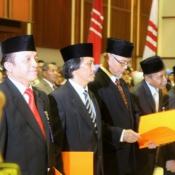Merging Of Indonesia’s Forestry And Environment Ministries Continues With Inauguration Event
Indonesia’s newly merged Environment and Forestry Ministry completed a major step in its restructuring last week with the inauguration of 13 director-generals, with important implications for President Joko "Jokowi" Widodo’s agendas on climate change, land reform and more.

This article was originally posted on Mongabay.
10 June 2015 | “I think the transition period of the last six months has been quite heavy,” the minister, Siti Nurbaya, said at the inauguration event in Jakarta on Friday. “We persevered through a difficult time,” she added.
Notable appointments include Climate Change Oversight Director-General Nur Masripatin, Environmental and Forestry Spatial Planning Director-General San Afri Awang and Social Forestry and Environmental Partnerships Director-General Hadi Daryanto, all of whom have held various Forestry Ministry positions before Jokowi combined it with the Environment Ministry upon taking office last year.
The Climate Change Oversight Directorate-General will take the reins of Indonesia’s climate change agenda in place of the now-defunct REDD+ Task Force (BP REDD+) and National Council on Climate Change (DNPI).
Earlier this year, Jokowi dissolved BP REDD+ to streamline the government, though some activists and officials have criticized the move, fearing Indonesia’s conservation agenda will languish under the weight of the ministry’s bureaucracy.
BP REDD+ was the world’s first cabinet-level institution dedicated to implementing REDD+, which refers to the global Reducing Emissions from Deforestation and Forest Degradation mechanism.
Nur’s appointment “effectively confirms that the entire climate change agenda will be managed by the Directorate-General of Climate Change Oversight,” Siti said at the inauguration.
The new department will handle climate change adaptation and mitigation; measuring, reporting and verification of progress; and forest fire control, according to the minister.
To preserve the institutional independence and objectivity of Indonesia’s cooperation with Norway, under which BP REDD+ was established in 2013, the ministry will establish a Steering Committee on Climate Change, led by Sarwono Kusumaatmadja, an environment minister during Suharto’s New Order regime. The committee will also include NGO representatives, other senior bureaucrats and foreign technical experts.
As head of the Social Forestry and Environmental Partnerships Directorate-General, Daryanto is in charge of realizing Jokowi’s promise to allocate 12.5 hectares to “social forestry” or “community-based forestry” schemes, which put land management in indigenous and local communities’ hands through community logging, village forest and other arrangements.
The new director-generals line up at their inauguration last week. Photo: Sapariah Saturi
Greenpeace forest campaigner Bustar Mitar noted that most of the appointees were old faces from the Forestry Ministry, and he urged them not to operate in the “old style.” In 2012, Indonesia’s Corruption Eradication Commission (KPK) named the Forestry Ministry one of the country’s most corrupt institutions.
Agrarian studies expert Noer Fauzi Rachman also expressed reservations about holdovers from the previous administration, including Awang and Daryanto.
“This is not a sign of change,” Noer said.
“If the attitude is still toward centralized and elitist decisionmaking that is not open to the people’s participation, these changes won’t mean anything,” he added.
The director-generals are all echelon I officials. The ministry now has to name echelon II, III, and IV officials. There will be 18 echelon I as well as 86 echelon II, 316 echelon III and 769 echelon IV officials.
The newly inaugurated officials:
1. Bambang Hendroyono, ministry secretary-general
2. San Afri Awang, environmental and forestry spatial planning director-general
3. Tachrir Fathoni, ecosystem and natural resources conservation director-general
4. Hilman Nugroho, watershed and protected forests director-general
5. Ida Bagus Putera, sustainable production forest management director-general
6. M.R. Karliansyah, pollution and environmental damage control director-general
7. Tuti Hendrawati, toxic waste materials management director-general
8. Nur Masripatin, environmental and forestry spatial planning director-general
9. Hadi Daryanto, social forestry and environmental partnerships director-general
10. Rasio Ridho Sani, environmental and forestry law enforcement director-general
11. Iman Hendargo Abu Ismoyo, ministry inspector-general
12. Bambang Soepijanto, head of the ministry’s Natural Resources Development Agency
13. Henry Bastaman, head of the ministry’s Research, Development and Innovation Agency
Additional resources
Please see our Reprint Guidelines for details on republishing our articles.

